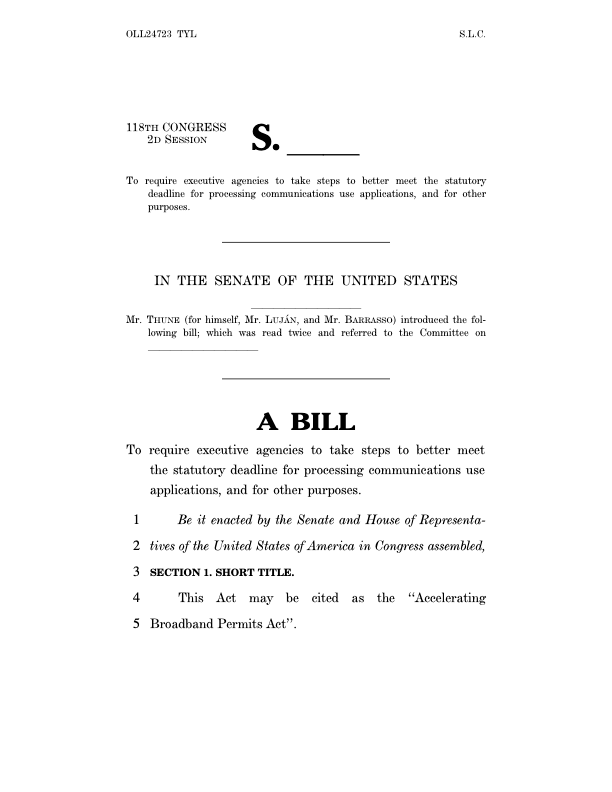Senate Bill Aims to Streamline Broadband Permitting on Federal Lands
The act aims to accelerate the review process for broadband permits issued by federal agencies.
Michael D. Melero

WASHINGTON, July 30, 2024 – Senators John Thune, R-South Dakota, Ben Ray Luján, D-New Mexico, and John Barrasso, R-Wyoming, introduced the Accelerating Broadband Permits Act on Monday to improve the review permit application process with federal agencies.

The act aims to accelerate the review process for broadband permits issued by federal agencies. It would require federal agencies to enhance tracking systems for project applications, and to notify a project applicant if they are likely to fail to meet an existing 270-day deadline for project review.
The measure would also require federal agencies to issue an annual report on any federal agency delays.
Thune stressed the need for federal agencies to process broadband permits in a timely manner, and they should be held accountable for delays to ensure reliable broadband in rural South Dakota. “I’m proud to introduce this legislation to accelerate service deployment in our communities,” he said in a press release.
The act incorporates recommendations from the Government Accountability Office's April 2024 report to improve communications and restore accountability in the Bureau of Land Management and the Forest Service. These federal agencies process most applications from providers to install communications equipment, facilities, and broadband internet on federal property, according to the report.
However, from 2018 to 2022, the report found that the Bureau of Land Management and the Forest Service lacked reliable data on processing times for 42% and 7% of their applications. It also noted that they did not record key information, such as start and end dates, which they couldn't track compliance with the 270-day statutory requirement to approve or deny applications.
"Many broadband providers have faced issues with the federal permitting process for applications on federal land,” said Barrasso. “This results in higher costs for internet providers and delays in closing the digital divide across rural America.” He stated that the act is to design the application process to allow more broadband projects to move forward more quickly, providing reliable internet services to rural communities in Wyoming.
“USTelecom appreciates Senators Thune, Luján, and Barrasso for their leadership in removing obstacles on federal lands that significantly delay permitting approvals,” said Jonathan Spalter, CEO of USTelecom, in a statement. He said the act would speed up broadband deployment to American communities.
In May, Thune and Barrasso issued a letter urging the Bureau of Land Management and the Forest Service to improve their handling of broadband infrastructure applications on federal land.
Last August, Telecom industry leaders pointed to permitting delays as a regulatory burden that could hinder the effectiveness of historical federal investments in digital infrastructure.
According to a 2023 Mountain Connect panel featuring telecom experts, they suggested that states and providers engage in the permitting process early, conduct thorough research, and minimize surprises by creating a permit plan. They noted that the average permitting process for building critical broadband infrastructure takes between 18 and 24 months.









Member discussion